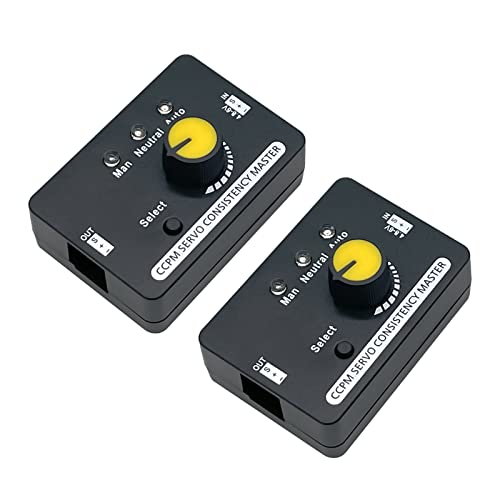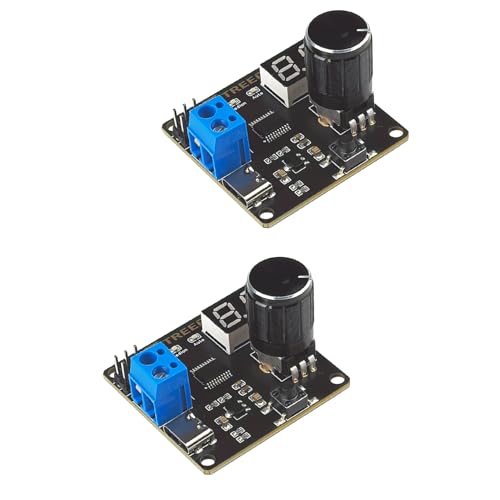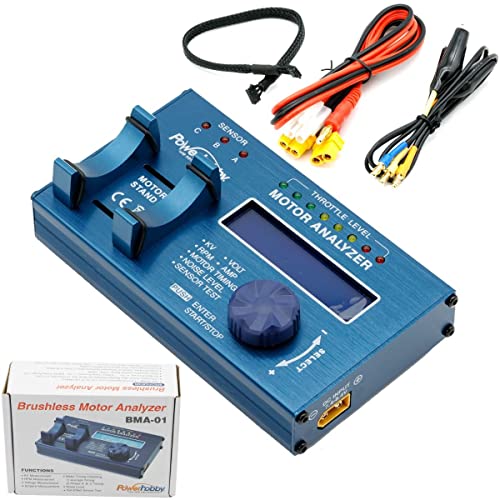As an Amazon Associate, we earn from qualifying purchases. Some links may be affiliate links at no extra cost to you. Although our opinions are based on curated research, we haven't used these products. Articles generated with AI.

5 Best RC Motor Testers: Get the Perfect Performance Every Time
Looking for the best RC motor testers? Check out the 2Pack RC Servo Tester Centering Tool for precise ESC and motor checks, and the RC Servo Tester 3CH for versatile signal generation. The compact 2pcs Digital Tester is perfect for cars and airplanes, while the SKYRC Motor Analyzer provides in-depth performance metrics. Finally, the BMA-01 offers detailed KV and RPM measurements. These testers guarantee your RC equipment performs at its best, so keep exploring to find your perfect match!
Key Takeaways
- The 2Pack RC Servo Tester provides precision for checking ESCs and motors while allowing simultaneous connection of up to three servos for efficient testing.
- The RC Servo Tester 3CH functions as a signal generator, offering three operational modes ideal for testing servos and ESCs without a transmitter.
- The compact Digital RC Servo Tester features real-time voltage monitoring, manual control, and over-current protection, making it versatile for various applications.
- SKYRC Brushless Motor Analyzer monitors key motor parameters like KV value and current, with an adjustable timing feature for improved efficiency in motor operation.
- The BMA-01 Brushless RC Motor Analyzer effectively measures essential metrics, with noise level analysis to identify potential vibration issues in motor setups.
2Pack RC Servo Tester Centering Tool for Remote Control Models
2Pack RC Servo Tester Centering Tool ESC Motor Checker Built in BEC 3CH High Precision for Airplanes...
- The ECS Motor Servo Centering Tool can easily detect the clearance, jitter and median of a kind of Servo .
- It is able to connect three sets of servo or ESC at the same time, use SCM to control.
- Power Supply:ESC built-in BEC or UBEC(4-5 pcs of #5 battery) to Provides power to the tester.No additional power supply need,connect the servo or ESC that you want to...
When you’re deep into the world of remote control models, the 2Pack RC Servo Tester Centering Tool is an essential tool for you. This handy device lets you check electronic speed controllers (ESCs) and motors with precision. You can connect three servos or ESCs simultaneously, simplifying your testing process. With the built-in BEC or UBEC, it operates without extra batteries, so you stay focused on your models. Its high accuracy guarantees you detect any servo jitter or clearance issues quickly. This tool is perfect for both hobbyists and professionals, enhancing your efficiency with various RC airplanes and FPV drones.
Best For: The 2Pack RC Servo Tester Centering Tool is best for hobbyists and professionals working with remote control models, particularly RC airplanes and FPV drones.
Pros:
- High accuracy for detecting servo jitter and clearance issues.
- Allows simultaneous connection of three servos or ESCs, streamlining the testing process.
- Operates without the need for additional batteries, using built-in BEC or UBEC.
Cons:
- Limited to testing only servos and ESCs, not suitable for other electronics.
- May require familiarity with RC technology for effective use.
- Bulkier than a basic servo tester, which might be less portable for some users.
RC Servo Tester 3CH Digital Multi Servo Tester
DIYmall RC Servo Tester 3CH Digital Multi Servo Tester ECS RC Consistency CCMP Master Speed...
- CCPM Servo Consistency Master/Servo tester
- The device also can be used as a signal generator for electric speed controller (ESC)
- With it, you can test your motor system without using a transmitter and receiver
The RC Servo Tester 3CH Digital Multi Servo Tester is a must-have tool for hobbyists looking to streamline their RC projects. This versatile tester functions as a signal generator for electric speed controllers (ESC), allowing you to test motor systems without the need for a transmitter or receiver. With three operational modes, you can easily check servos or ESCs, while detecting jitter and configuring servo virtual spaces. It connects up to three servos for CCPM helicopters, offering the ability to select individual units for testing. Plus, the included customer support is always ready to help with any questions you might have.
Best For: Hobbyists and RC enthusiasts who need a reliable tool for testing servos and electric speed controllers without a transmitter.
Pros:
- Versatile tool functions as a signal generator for ESCs.
- Offers three operational modes for checking both servos and ESCs.
- Supports connection of up to three servos, ideal for CCPM helicopters.
Cons:
- Limited to testing only up to three servos at a time.
- May require additional knowledge for optimal use in different modes.
- Customer support availability may vary depending on the region.
2pcs Digital RC Servo Tester for RC Cars and Airplanes
Treedix 2pcs Digital RC Servo Tester with Over-Current Protection 3 Control Modes 2 Display Modes...
- Using high-precision potentiometer, can control the steering gear in real time. High resolution PWM signal, onboard 8-bit single chip microcomputer, so that the control...
- Two display modes: Real-time voltage display mode: can monitor the voltage of the power supply equipment in real time. Steering gear position percentage display mode: The...
- Three control modes: manual steering gear controller,steering gear reset back to center, automatic steering gear controller, by pressing the button to switch control...
For RC enthusiasts and engineers looking for precision, the 2pcs Digital RC Servo Tester stands out with its impressive features like over-current protection and a wide power range of DC 5V-8V. This compact device measures just 1.59 x 1.55 x 0.07 inches and weighs only 1.13 ounces, making it super portable. You can easily control servos in manual mode or reset them to center, so testing’s a breeze. With real-time voltage monitoring and PWM signals generated for accuracy, you’re set for detailed evaluations. Plus, it works for everything from robotic arms to kayak trolling motors, enhancing your RC projects effortlessly!
Best For: RC enthusiasts and engineers seeking a compact and precise tool for testing servos in various applications.
Pros:
- Compact and lightweight design for easy portability and mounting.
- Versatile control modes including manual, reset to center, and automatic steering gear control.
- Real-time voltage monitoring and high-precision PWM signal for accurate performance evaluations.
Cons:
- Lack of detailed instructions may require users to create their own reference materials.
- Some users noted it primarily useful for smaller RC servos, limiting its application scope.
- The specific power supply requirement via screw terminal could be inconvenient for some setups.
SKYRC Brushless Motor Analyzer Monitor Tester (SK-500020-01)
SKYRC SK-500020-01 Brushless LCD Display 3 Mode Motor Analyzer Monitor Tester for Hobby Remote...
- prod_mpn_SKY-500020, prod_var_mpn_SKY-500020, product_rcs, SHIPPING_GROUPS_uslarge
Step into the world of precision with the SKYRC Brushless Motor Analyzer Monitor Tester (SK-500020-01), an essential tool for hobbyists tuning their RC cars. This compact device measures vital parameters like KV value, RPM, and current from your brushless motor. Its blue backlit LCD shows real-time data, making it easy to track motor performance. You can adjust motor timing between 0 and 70 degrees, enhancing your setup efficiently. Plus, it helps identify vibration noise levels impacting motor efficiency. With a user-friendly design and excellent support, this affordable tester is perfect for hobbyists seeking peak performance from their motors.
Best For: Hobbyists and enthusiasts looking to tune and optimize the performance of their brushless motors in remote control vehicles.
Pros:
- Provides essential measurements such as KV value, RPM, and current for effective motor tuning.
- User-friendly interface with a blue backlit LCD for easy real-time monitoring.
- Affordable option for hobbyists compared to higher-end motor testing devices.
Cons:
- Accuracy may not match that of more expensive models, leading to some variability in results.
- Limited technical features compared to professional-grade analyzers.
- Requires a specific input voltage (7.4-8.4V) limiting compatibility with other power sources.
BMA-01 Brushless RC Motor Analyzer RPM KV Voltage Checker
Power Hobbies BMA-01 Brushless RC Motor Analyzer RPM KV Voltage Checker (Sensored & Sensorless)
- KV / VOLT / RPM / AMP
- Average Motor Timing
- Noise Level
BMA-01 Brushless RC Motor Analyzer is the perfect tool for hobbyists and racers enthusiastic to optimize their electric motors. With its ability to measure KV values, RPM, and current at specific throttle levels, you’ll easily understand your motor’s performance. The LCD with a blue backlight shows relevant metrics, like voltage input and average motor timing. You’ll appreciate its noise level analysis, highlighting issues from vibration or unbalanced rotors. Supporting both sensored and sensorless motors, this analyzer helps you achieve the best results. Weighing just 282 grams, the BMA-01 is compact and essential for fine-tuning your motor setup!
Best For: Hobbyists and racers looking to optimize the performance of their electric motors through accurate measurements.
Pros:
- Versatile Measurement: Accurately measures KV value, RPM, current, and motor timing for comprehensive motor analysis.
- Noise Level Analysis: Helps identify potential issues such as vibration and unbalanced rotors, ensuring quieter and more efficient motor performance.
- Compact Design: Weighs only 282 grams, making it easy to transport and use in various setups.
Cons:
- Limited Input Voltage Range: Only supports a narrow input voltage range (7.4-8.4V), which may not be suitable for all setups.
- Moderate Customer Rating: A rating of 4.3 out of 5 stars indicates that some users may have experienced issues or are less satisfied.
- No Detailed Product Support: Lacks extensive documentation or tutorials for users unfamiliar with motor analysis.
Factors to Consider When Choosing an RC Motor Tester

When choosing an RC motor tester, you’ll want to focus on several key factors to make the best choice for your needs. Consider the specific features that suit your projects, how well the tester works with your existing models, and the variety of testing options available. Don’t forget to check for ease of use and what power supply you’ll need to keep everything running smoothly.
Key Features Analysis
Selecting the right RC motor tester is essential for optimizing your model’s performance, so you want to take into account several key features before making a decision. First, look for testers that measure critical metrics like KV value, RPM, current, and motor timing. These metrics help you assess your motor’s efficiency and performance. Make sure the tester supports both sensored and sensorless motors, offering versatility in your applications. A display with backlight illumination is a must for reading measurements in any lighting. Additionally, consider models that monitor multiple parameters simultaneously, providing thorough evaluations. Finally, evaluate the weight and size for portability, making it easier for you to test in field setups wherever you go!
Compatibility With Models
Choosing an RC motor tester that’s compatible with your specific models can make all the difference in how well your setups perform. First, confirm the tester works with both sensored and sensorless motors, allowing for greater versatility. Next, check the voltage range; a model that supports 7.4V to 8.4V is perfect for 2S LiPo batteries. It’s also beneficial to select testers that connect multiple servos or ESCs, making your testing process quicker. Additionally, look for testers tailored to your model type—whether it’s for airplanes, cars, helicopters, or boats. Finally, verify that the tester can measure essential parameters like KV value, RPM, and current to guarantee your motor aligns perfectly with your setup.
Testing Functionality Options
Having the right RC motor tester goes beyond just compatibility; testing functionality options play an important role in maximizing your setup’s performance. Look for testers that act as signal generators for servos and electronic speed controllers (ESCs), allowing you to test diverse motor systems without a transmitter. Choose models with multiple operational modes, letting you detect jitter, create servo virtual spaces, and measure medians for enhanced accuracy. Make certain it can handle the number of servos you need; some testers connect up to three simultaneously—ideal for CCPM helicopters. Real-time monitoring features that display voltage, RPM, and current are significant too. Finally, opt for those with versatile power supply methods, like built-in batteries or external options, to match your testing environment.
Ease of Use
When it comes to picking an RC motor tester, ease of use is essential to guarantee you get the most from your testing sessions. Look for testers with intuitive controls and clear displays that make understanding results a breeze. Connect multiple servos or ESCs simultaneously to simplify your testing process and save time. Real-time voltage and performance metrics help you quickly interpret data without needing complicated math. Opt for models featuring preset configurations that cut out the need for extra transmitters or receivers, streamlining your setup. Additionally, a compact and lightweight design is perfect for on-the-go testing or fitting into tight spaces. Choosing a user-friendly tester enhances your overall experience and maximizes your performance.
Power Supply Requirements
Power supply requirements can greatly influence your choice of an RC motor tester, so understanding these needs is crucial before you make a purchase. Most testers operate within a voltage range of 5V to 8.4V, depending on their design. Some models come with built-in battery eliminator circuits (BEC), allowing you to power them directly from your electronic speed controller (ESC). If you’re testing multiple servos or motors, it’s essential to have a stable power supply to guarantee accurate results. Fortunately, many testers can run on standard AA batteries, giving you flexibility when a plug-in option isn’t available. Finally, check for USB-C compatibility, which adds convenience and compatibility with your modern devices. Happy testing!
Price and Value Comparison
Choosing the right RC motor tester isn’t just about finding the lowest price; it’s about finding the best balance between cost and the features you actually need. Start by evaluating the price relative to the features offered, like voltage monitoring and RPM tracking. Many budget options might cover basic needs, but as a serious hobbyist or competitor, you may want advanced options like noise level analysis. Also, check customer ratings to see which models hold up in real-world use. Understand that if tuning and precision are essential, investing in a higher-priced model could pay off. Finally, comparing different models helps you pinpoint which one delivers the best value tailored to your RC applications—maximizing your performance without breaking the bank.
Frequently Asked Questions
Can I Use an RC Motor Tester for All Types of Motors?
You can’t use an RC motor tester for all types of motors. Most testers focus on brushless and brushed motors commonly found in RC vehicles. They check RPM, amp draw, and voltage, so you’ll get valuable performance insights. However, if you’re dealing with larger motors, like those in drones or planes, you might need specialized equipment. Always check the specifications of your tester to guarantee compatibility with your motor type before testing!
How Do I Calibrate My RC Motor Tester?
To calibrate your RC motor tester, first, connect it to the motor and power it up. Select the motor type and set your desired voltage. Adjust the trim settings on your transmitter for neutral position, then gently increase throttle input while monitoring the tester’s display. Verify that the readings match your expectations. After adjustments, test the motor’s response. Repeat as necessary to confirm accuracy. Now, your setup is primed for peak performance!
What Is the Warranty Period for RC Motor Testers?
The warranty period for RC motor testers typically ranges from six months to two years, depending on the manufacturer. Some brands might offer extended warranties or guarantees if you register your product. It’s vital to check the specific details on your tester’s packaging or the manufacturer’s website. This guarantees you know what coverage you’ve got in case of defects or malfunctions. Keeping the receipt also helps when claiming your warranty.
Are There Any Safety Precautions While Using Motor Testers?
Absolutely, safety’s key when you’re using motor testers! Always wear safety goggles to protect your eyes from potential sparks. Work in a well-ventilated area to avoid inhaling harmful fumes. Make certain to disconnect power sources before adjusting connections to prevent electric shocks. Also, keep your hands dry and avoid touching live wires. Finally, double-check all settings before powering on the tester,
Can a Motor Tester Help Diagnose Performance Issues?
Absolutely, a motor tester can help you diagnose performance issues effectively. Imagine this: your RC motor stutters or doesn’t respond. By connecting it to a motor tester, you easily measure voltage, current, and RPM. It reveals inconsistencies that hint at problems like bad connections or worn brushes. With clear data in front of you, you can pinpoint what needs fixing, ensuring your RC vehicle runs smoothly and performs at its best every time.









